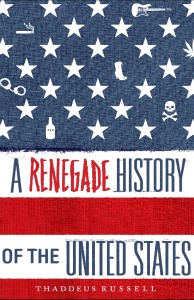 We like to romanticize the American past. Thaddeus Russell, in his book “A Renegade History of the United States,” (2010) does somewhat the opposite. He shows how our cherished, traditional views of American history may not tell the whole story. This is not a partisan book; there is no political agenda or even any political point of view. He’s just a historian who says, “It didn’t necessarily happen like you were taught.”
We like to romanticize the American past. Thaddeus Russell, in his book “A Renegade History of the United States,” (2010) does somewhat the opposite. He shows how our cherished, traditional views of American history may not tell the whole story. This is not a partisan book; there is no political agenda or even any political point of view. He’s just a historian who says, “It didn’t necessarily happen like you were taught.”
I love this kind of stuff. At the same time, I don’t swallow everything Russell writes as the Gospel truth; it’s dangerous, and simple-minded, to believe a writer just because you are predisposed toward their views. But, like a good historian, he documents what he writes. Most of it rings true.
His continuing thesis is that much of what made American great is attributed to the dregs of society—the underclass, the scorned, immigrants, minorities, criminals. The renegades. He brings these people to light in fascinating ways. This contrasts with the traditional narrative that America’s greatness is the fruit of brave and righteous people who fought for freedom and justice. Yes, there were plenty of those people. But he shows how America excels at assimilating renegades, and how they’ve made real contributions to Who We Are.
For instance, Russell contends that prostitutes did as much as anyone to advance women’s rights, and were among the wealthiest—and most liberated–women of the American West. He shows how mobsters advanced gay rights (most early gay bars were backed by the mob). He deals at length with some of the immigrant classes and how they were initially scorned—the Irish, Jews, Italians, and others. He delineates the contributions and culture of rednecks and hippies. He has chapters like this:
- “How Gangsters made America a Better Place.”
- “How Juvenile Delinquents Won the Cold War.”
- “Whores and the Origins of Women’s Liberation.”
The most interest chapter, to me, was the first: “Drunkards, Laggards, Prostitutes, Pirates, and Other Heroes of the American Revolution.” He portrays a Colonial America far different from the genteel, astutely-dressed, well-mannered society we typically envision. Our image relates only to the upper classes, who may have held power, but they were the minority. A whole different kind of society existed for the lower classes, including the thousands and thousands of people pouring off the boats from Europe, trying to make their way in the New World. They were a rowdy, immoral bunch, doing whatever they could to survive in a land without rules.
The most controversial part of the book comes next—chapters about slavery. He paints a very politically incorrect picture, yet one which I’m sure bears much truth. It rings true to me, and fits with other things I’ve read. While he emphasizes that slavery was a horrible thing which needed to end, he portrays the daily plight of slaves as not quite as bad as we usually think.
There were parts of this book I loved, and parts I found not so interesting. But overall, it’s a book I highly recommend if you are intellectually curious enough to let your presuppositions be challenged.





